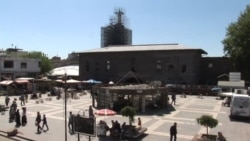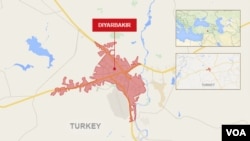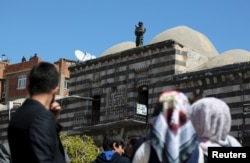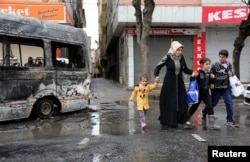A year ago, Turkey's biggest city in the predominately Kurdish region, Diyarbakir, was hoping to cash in on a wave of tourists attracted to its rich history and legacy of multiculturalism. However, the collapse of a cease-fire last July between Kurdish rebels and the government led to violence, dashing hopes for a vibrant tourism industry and the city's economic revival.
The months of bitter fighting between Kurdish rebels and Turkish security forces had hit stores especially hard; they were forced to close as part of a months-long, round-the-clock curfew imposed by security forces as they sought to remove armed rebels who had taken control of parts of the city.
But the lifting of the curfew brought little relief.
"Here was the busiest street of Diyarbakir, but now it is zero!" said one shopkeeper who did not want to give his name. "There are police barriers; the atmosphere is not good for business. After being closed for four months, we can hardly get back on track. There is no business. We can't even afford a meal a day."
It was meant to be so different. Diyarbakir’s city wall was awarded world heritage status last year by UNESCO. The honor brought hopes of a surge in tourism and a belief that the city was ready to turn a corner. Many hotels sought to cash in, borrowing heavily to renovate.
Some, however, were taken over by security forces during the fighting. And this led to a collapse of business, especially in the neighborhood of Sur, according to the local mayor, Azize Deger.
Customers needed
Deger said that for more than eight months, no tradespeople in Sur have done any business. She said people living in Diyarbakir should do their shopping in Sur to revive business. The traders, she said, have lots of debts, especially to the banks, and haven't been able to repay them, "so they are going through serious hardships."
While local residents have heeded calls to return to the tourism quarter, an atmosphere of uneasy peace exists. Turkey's ruling AK Party says the rebels are to blame for the decline because they overran parts of the city, forcing security forces to act. The party, however, has promised to rebuild Diyarbakir and revitalize the economy, according to Muhammed Akar, the head of the party in the city.
Akar acknowledged that Diyarbakir has gone through painful, troubling days and that problems were continuing. He said the government has an action plan for Diyarbakir and the wider region.
The government has broadcast a video stressing its commitment to restore the city, but it apparently provides little comfort for those who invested in cafes before the fighting. One cafe owner, Merthan Anik, said the military crackdown taught a painful lesson: If you dare to invest in Diyarbakir, you risk losing everything.
So Diyarbakir is again associated with violence and conflict, and for tourists, it remains on the list of unsafe places.








